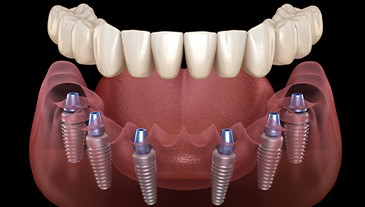Dentures – Lakeway, TX
Come Get Your Bite Back
Oris Dental Studio offers denture services as part of our restoration dentistry offerings. While dental implants have grown in popularity, dentures have been used for teeth replacements for many years. Depending on multiple factors, dentures from our Lakeway dentist are still very much a preferred option by many. Our services are offered to those residing in the Bee Cave, Lakeway, and The Hills, TX areas. If you’d like to find out whether or not it’s right for you, continue reading or give us a call today to schedule an appointment.
Who’s a Good Candidate for Dentures?

Whether you're missing a few teeth or an entire arch, dentures could be the solution. To find out if this smile-rebuilding option is right for you, visit Dr. Pedersen for a comprehensive exam during your initial consultation. If any untreated dental issues such as tooth decay or gum disease are identified, we will incorporate the necessary care into your treatment plan to ensure your oral health is in optimal condition, giving you a stunning smile you can be proud of.
Effects of Missing Teeth

Tooth loss can be caused by multiple different factors. The most common include tooth decay, gum disease, and injury. According to the American Academy of Periodontology, missing teeth results in a wide array of consequences. Tooth loss can lead to facial sagging, difficulty speaking clearly, difficulty chewing, and low self-confidence. Fortunately, dentures are able to improve all of these aspects of your life and more!
What Qualifies You for Dentures

The majority of adults are able to get dentures without too much of a problem. They are ideal for those who are missing several, most of, or all of their teeth. People who wear dentures must maintain healthy gum tissue and have sufficient jawbone. After missing teeth for a long time, the jawbone is reabsorbed by the body, therefore resulting in bone loss. If you currently have any dental issues, like gum disease or tooth decay, these things need to be addressed and eliminated before you can move forward in the process of getting dentures.
Alternative Tooth Replacement Options

If you are not a candidate for dentures or they don’t sound appealing to you, there may be another tooth replacement option that will better complete your smile. Here are the other ones that we offer:
- Dental Bridges: A dental bridge works by “bridging” the gap in your smile where your tooth is missing. Bridges are great for people who are only missing a single tooth or a couple of consecutive teeth. A dental bridge requires that the patient has healthy adjacent teeth surrounding the empty space to support it.
- Dental Implants: A dental implant is a titanium, screw-like post that is surgically inserted in the jawbone. In order to get dental implants, patients need to have a sufficient jawbone structure and be able to undergo a minor surgical procedure. Dental implants have a higher upfront cost, but they last for many decades or even the rest of your life!
Types of Dentures

Oris Dental Studio provides a variety of wholesome restorative dentistry options. Our expertly trained smile consultants can recommend the best option for you or your family member. Our expertly trained dentist will recommend one of the following denture options depending on what’s best for you:
Partial Dentures
As the name implies, partial dentures only replace some of your teeth. Using clasps attached to your remaining natural teeth, these dentures feature a gum-colored base and custom prosthetic teeth to flawlessly complement your existing smile. The result is a fully functional and undeniably beautiful smile that you can confidently enjoy.
Full Dentures
For those missing an entire arch of teeth, full dentures offer the ideal solution. Like partial dentures, full dentures feature a discreet, gum-colored base and lifelike prosthetic teeth. However, this option is typically secured in place using natural suction, denture adhesive, or a combination of both methods.
Implant Dentures
Implant dentures combine the best of traditional dentures with cutting-edge dental implants. Instead of relying on clasps or natural suction to hold your new smile in place, this restoration is anchored to a titanium post that is surgically implanted directly into your jawbone. This innovative approach ensures maximum stability, eliminating any unwanted movement.
How Dentures are Made

Many patients are surprised to learn that they may have to wait a little while until their dentures arrive. Understanding the process behind how they’re created can help ease any frustration, and you might gain an even deeper appreciation for your new restoration. Whether you’re eagerly anticipating a partial, full, or immediate set of dentures, keep reading to learn more about how they’re made.
What are Dentures Made Of?

Dentures consist of two different parts; the base that touches your gums and the teeth (or pontics). Below is a description of each:
- Denture base: This is the foundational portion that gives your artificial teeth the support they need to retain their shape. They can be made from a variety of durable materials like acrylic, nylon, porcelain, resin, or metal. Usually, full dentures have an acrylic base that’s customized to match your natural gum tissue. Partial dentures often include metal clips in their acrylic base to anchor to neighboring teeth. Depending on your provider, nylon may be used instead of acrylic.
- Pontics: These are typically made from composite resin or porcelain because they can both be color-matched to any remaining teeth. Porcelain tends to be used more frequently because the durable ceramic provides a natural look and feel. If you’re getting partial dentures, however, porcelain may not be the optimal choice because it can be abrasive on adjacent teeth.
The Denture Creation Process

Dentures are fully tailored to fit your grin precisely, so it generally takes more than one appointment to complete. The entire process from start to finish normally includes:
- Step 1: Pedersen will take impressions of your upper and lower gums and bite alignment. Traditionally, this was done using a thick paste that patients would bite into to create a negative mold. Now, advanced technology like CAD/CAM Systems allows our team to make virtual impressions to enhance patient comfort as well as the accuracy of the results.
- Step 2: The impressions are sent to a dental laboratory to begin building them. First, they create a wax version of your gum line to establish a foundation.
- Step 3: Next, the artificial teeth are placed. A mechanical device, called an articulator, is used to attach these to the wax base. Then, a technician will shape and carve the wax to replicate the images of your gums. This will be used later for your finished restoration.
- Step 4: This wax version is sent to Dr. Pederson so he can schedule an appointment for you to try them out. He’ll note whether any changes need to be made, and then return them to the lab.
- Step 5: A technician will place the dentures in a flask which is placed in boiling water to melt the wax away.
- Step 6: Holes are made in the artificial teeth and a liquid separator is added to the plaster layer to stop the acrylic from sticking to it. Then, acrylic is injected into the flask to replace the wax.
- Step 7: The plaster is carefully removed using special instruments to reveal the acrylic denture beneath. This is then placed in an ultrasonic bath to remove any leftover plaster.
- Step 8: Any excess acrylic will be trimmed away and then the dentures will be polished.
- Step 9: This will be returned to Dr. Pedersen so he can schedule you for a final fitting. If any additional changes need to be made, that will be noted, and they’ll be returned to the lab to be corrected. Otherwise, you can finally take them home!
Adjusting to Your New Dentures

Once you have a beautifully refurbished smile, it may take some getting used to. It’s normal to experience some mild soreness and have challenges eating and speaking for the first month of wearing your new dentures. In time, you’ll learn how to use the muscles in your mouth to hold them in place when chewing or forming words. If you need a little help, denture adhesive can create a day-long bond that helps hold them in place. Soon, you’ll find that you’ve grown accustomed to wearing them and might even forget they’re there!
The Benefits of Dentures

Dentures are a life-changing tooth replacement option for people who are missing multiple, most of, or all of their teeth. They can help to improve one’s quality of life in a multitude of ways. Continue reading to learn about some of the incredible benefits that dentures have to offer.
Psychological Benefits

If you don’t have any healthy teeth in your mouth, this can be a challenging thing to accept. Many people who no longer have teeth find themselves avoiding social situations. They are also at higher risk of becoming sad and depressed. By restoring the appearance and function of the teeth with dentures, patients experience reduced anxieties about their appearance, speech articulation, chewing ability, and much more.
Clearer Enunciation

Having gaps in your smile can make it more difficult to make certain sounds and say different words. To pronounce and perform your words, your lips and tongue need to be positioned in a specific way. When you have gaps in your smile, the tongue cannot sit against your teeth making some words nearly impossible to say. After getting dentures and with a little bit of an adjustment period, you will be talking just like you used to.
Improves Nutrition

Many of the nutrient-dense foods that are good for you are tough in texture. This includes healthy proteins, fruits, and vegetables. If you are unable to chew your food thoroughly due to missing teeth, this can have a negative influence on your eating habits, ultimately leading to indigestion and even malnutrition! With dentures, you can chew your food more easily, allowing you to enjoy a more expansive diet.
Preserves Oral Health

If you still have some healthy teeth, dentures can help to keep them in good shape for longer. By filling in the gaps in your smile with partial dentures, you can prevent the surrounding teeth from shifting around. Dentures also help to bear some of the weight of routine chewing, limiting the wear and tear of your existing teeth.
Expands Opportunities

Making a good impression is key when you are attending interviews, negotiating sales, and attending social gatherings. Your smile is one of the very first things that people notice about you, so having teeth that appear to be healthy will do nothing but help you in your endeavors. Studies have even found that the probability of being employed is negatively associated with poor dental health.
Understanding the Cost of Dentures

Dentures are a life-changing tooth replacement option for those who have suffered from significant tooth loss. However, you may be unsure what to expect in terms of cost. During your consultation, we will go over the cost of your treatment in detail, so you don’t run into any surprises. Until then, here are some things to take into consideration.
Factors That Affect the Cost of Dentures

There are various factors the contribute to the cost of dentures. Here are the most prominent ones:
- Preparation: If you need a preliminary procedure, like a tooth extraction of gum disease treatment, before you can get dentures, you should consider their costs as well.
- Materials: Dentures can be made from multiple different types of materials, and they are all priced differently.
- Type of Denture: If you are getting a partial denture, this will likely cost less than a full denture. Implant dentures are priced higher, as they require surgical treatment.
Are Implant Dentures More Expensive?

Yes, implant dentures have a higher cost than traditional dentures. This is due to the dental implants being surgically placed in the jawbone. This technique allows for additional benefits. Implants dentures are made to be permanent, and they are more stable than traditional dentures. You also don’t need to worry about shifting, slipping, clicking, or limiting your diet either. Dental implants are an investment in the future of your smile, and this investment pays off over time.
Does Dental Insurance Cover Dentures?

Dentures are considered to be a major restorative treatment, so they are usually covered up to 50% by dental insurance providers after the deductible has been met. That being said, every plan works differently, so it is always best to confirm this with your provider ahead of time so you know what to anticipate. If you have questions regarding your plan and coverage, one of our friendly team members would be happy to assist you.
Other Options for Making Dentures Affordable

If you don’t have dental insurance, this doesn’t mean that you are completely out of luck. We are proud to accept payments through CareCredit – a third-party financing company that can split the cost of your implants into manageable monthly installments with little to no interest. If you have any questions or need help applying for a plan, don’t hesitate to contact us.
